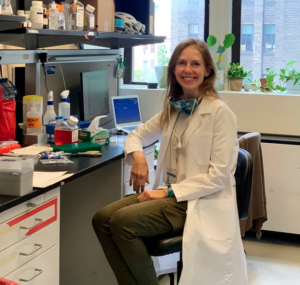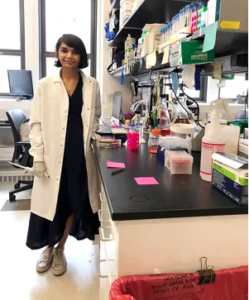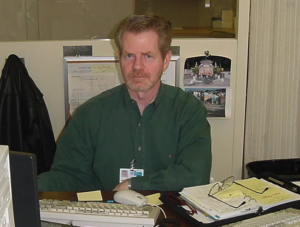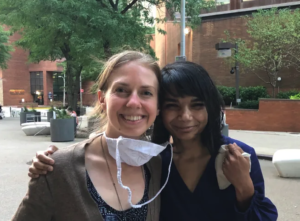By Phoebe Wall Howard – September 3, 2020
The UAW is aggressively pushing beyond the auto industry, now breaking new ground to include postdoctoral researchers from a top private university — the brightest minds from medicine, climate science, chemistry, engineering and computation.
This is not your father’s labor union.
All the new UAW members are Ph.D.s or medical doctors, and more than 400 of these researchers volunteered at Columbia University Medical Center during peak periods of COVID-19 in New York.
These new members of the UAW are not students or professors, as is often misunderstood. They have completed their undergraduate and graduate training in their areas of expertise, and will eventually run their own public or industry labs working to transform health, science and technology.
“We organized, fought for and established a more just workplace,” said Melissa McKenzie, 36, a research scientist who specializes in RNA splicing and how brain cell development is linked to autism.
“After going years with the lowest starting salaries in New York City, Columbia postdocs will now have the highest minimum salaries in the city,” she said.

The Detroit-based union known for fighting to protect pay and benefits of hourly factory workers employed by Ford, General Motors and Fiat Chrysler Automobiles just added 1,700 new researchers from Columbia University, most of them working to eradicate cancer, Alzheimer’s, Parkinson’s, diabetes and other diseases.
All the new UAW members are Ph.D.s or medical doctors, and more than 400 of these researchers volunteered at Columbia University Medical Center during peak periods of COVID-19 in New York.
These new members of the UAW are not students or professors, as is often misunderstood. They have completed their undergraduate and graduate training in their areas of expertise, and will eventually run their own public or industry labs working to transform health, science and technology.
“We organized, fought for and established a more just workplace,” said Melissa McKenzie, 36, a research scientist who specializes in RNA splicing and how brain cell development is linked to autism.
“After going years with the lowest starting salaries in New York City, Columbia postdocs will now have the highest minimum salaries in the city,” she said.
Protecting benefits that are already intended for researchers is as important as getting new benefits, McKenzie explained.
After a June agreement with the university, researchers voted 859-7 to ratify the Columbia Postdoctoral Workers-UAW on July 16, bringing minimum pay to $60,000 while establishing six weeks of paid parental leave and rights for international researchers.
‘Denied vacation’
A primary issue of concern, these workers say, are protections against sexual harassment and a stable work environment.
“Working conditions for a young researcher are quite unstable and inconsistent,” said Tulsi Patel, 32, a research scientist who studies brain control of motor function and its application to diseases including Lou Gehrig’s.
“How you’re treated and how your future career goes is dependent on one professor you work for. Some situations are excellent and people are treated well and paid well and others are struggling,” she said. “This is about having consistent rules. Some people will be working all the time and denied vacation. Now they can take vacation days without fearing a professor” will punish them.

Patel, who relocated to Manhattan from Acworth, Georgia, said scientists are so focused on being in the lab that people rarely think about protecting pay and benefits until there’s a problem — then challenges disrupt the ability to work.
“When we tell people we’re unionizing with the UAW, it comes up as strange,” she said. “But the UAW has really been leading the charge, especially when it comes to sexual harassment protection.”
Factory inspiration
McKenzie, who is from Duxbury, Massachusetts, looked to her uncle for advice and inspiration when she organized Local 4100. He had been a union voice at Ford and a management voice at GM.
Ken McKenzie, 75, came home from Vietnam after serving in the U.S. Army and enrolled in an electrical apprentice program that landed him at a Ford plant in New Jersey. As a UAW member, he authored local rules on how overtime hours were allocated.
“I know that any unrepresented group has problems, especially if the people above in management … do not understand the problems you have,” Ken McKenzie said. “Unions are necessary and management is necessary. They really have to work together.”
When the Ford plant closed, McKenzie went on to work as a plant engineer for Becton Dickinson Pharmaceuticals, where he managed a maintenance group of skilled workers and handled contract negotiations. It’s there that he learned the importance of explaining how union demands would benefit the company.
And he shared this wisdom with his niece.
Winters in Michigan
McKenzie ended up at a GM assembly plant in Tarrytown, New York, after earning a bachelor’s degree, and supervised UAW skilled trades. Finally, he would move to the GM Warren Tech Center to work with the UAW management team responsible for standardizing and modernizing maintenance practices, he said.

That effort, McKenzie said, may be the most successful and effective partnership between the union and management “ever in the automotive industry.”
“The effort proved that together the company and union could effect change that benefited the company financially while improving health, safety and job security for the union,” said the man who winters in Oxford, Michigan, to avoid the harsh Eaton, New Hampshire, climate.
McKenzie said he’s proud of his niece for creating UAW protections for researchers. “Unions still have a fight on their hands. But there are a lot more enlightened management people.”
Working in the auto industry shapes people forever, he said. “And the UAW has expertise in how to organize.”
Beer and poker
Higher education is one of the fastest-growing membership groups fueling the United Automobile, Aerospace, and Agricultural Implement Workers of America (UAW).
Monthly total UAW membership hovers around 400,000 with academic workers making up an estimated 80,000, including the University of Michigan, the University of Chicago, the University of California, Harvard University, Brown University, Boston College and others.
This push to diversify is intended to create additional financial protection for all members, as everyone pays into the strike fund. New members say UAW lawyers work hard to create strong contracts, and that’s why higher education membership is spreading.
Academic workers cite the need for structural recourse to sexual harassment as a main reason to unionize, UAW officials said.
“Academic workers across the country are organizing because the challenges they face … are best addressed by standing together,” said Beverley Brakeman, UAW Region 9A director based in West Hartford, Connecticut.
‘Rigorous, respectful’
Columbia credited union negotiators for their constructive approach to “complex matters” and praised the priorities outlined by union organizers as good for the whole school.
Ira Katznelson, interim provost at Columbia, praised ratification of the union agreement.
“In the midst of a wrenching period for higher education, it is good to catch up on positive news,” he said in a letter to the university community. “This contract marks a significant milestone in the university’s relationships with postdoctoral researchers, associate research scientists and scholars. The agreement’s provisions reflect rigorous, respectful and mutually successful negotiations.”
Few may realize that the UAW represents members who work in everything from casino gaming to beer production to farm equipment.
The UAW, which has members in the U.S. and Canada, also has established a foothold at the Brooklyn Academy of Music in New York, McLaren Central Hospital in Mount Pleasant, Michigan, Vegas casino workers from Paris, Wynn, Bally’s, Harrah’s and Caesar’s Palace, aerospace company Triumph Aerostructures in Florida and auto parts suppliers Euclid Manufacturing in Detroit, Faurecia in Missouri and Volvo Parts in Nevada.
These are the members whose dues paid autoworkers during the 40-day strike against GM in 2019. An academic UAW member in California said at the time he was honored to support his brothers and sisters in Michigan.

“We believe in the power of collective bargaining to make change,” Melissa McKenzie told the Free Press on Tuesday. “We are on the front lines of solving disease. It’s becoming increasingly hard to be a scientist. This empowers us to pursue our dreams, advance medicine and make life better for all of us.”
Contact Phoebe Wall Howard: 313-222-6512 or phoward@freepress.com. Follow her on Twitter @phoebesaid.
